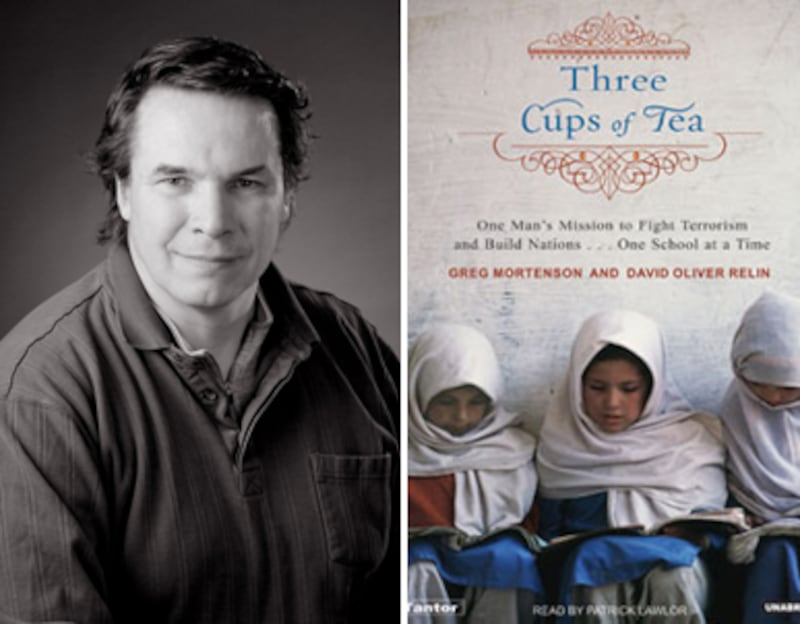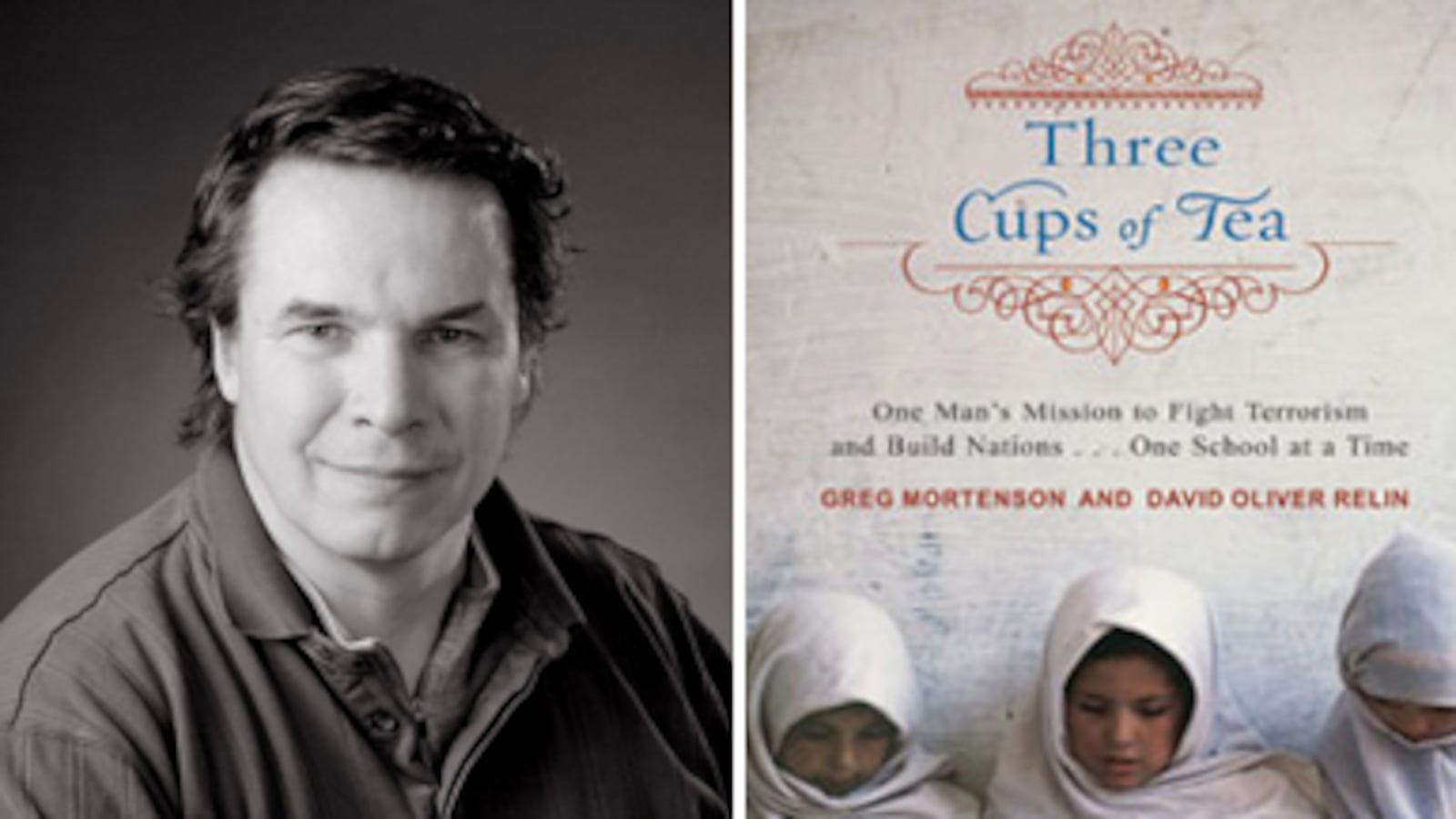A bombshell 60 Minutes report has left the writer’s Three Cups of Tea memoir—which earned him millions and made him a humanitarian folk hero—in tatters. Lloyd Grove and Mike Giglio report on the fallout. Plus, Mortenson's Pakistani host Mansur Khan Mahsud exposes his lies.
When 60 Minutes was finished with superstar philanthropist and U.S. military adviser Greg Mortenson on Sunday night, the author of Three Cups of Tea—a 2006 bestselling memoir of adventures and good works in Afghanistan and Pakistan—was in a million little pieces.

Correspondent Steve Kroft reported that key anecdotes in Mortenson’s inspirational narrative—which launched him as a humanitarian folk hero, attracted $60 million in donations to his nonprofit Central Asia Institute, and personally earned him millions of dollars in book royalties and lecture fees—appear to have been fabricated. ( Click here to watch the full report.)
“Another hero bites the dust,” MTV founder Tom Freston, a frequent visitor to Afghanistan, told The Daily Beast. Freston lived in Kabul in the late 1970s, traveling the hardscrabble country as a garment exporter. “And it’s especially bad in this case, as there are so few heroes in that troubled part of the world.”
Afghan media mogul Saad Mohseni, whose Moby Group runs the nation’s dominant television and radio outlets, reacted with sorrow at the report.
“If the allegations are true,” Mohseni told The Daily Beast, “then it is a tremendous blow to humanitarian and education related nongovernment work in Afghanistan and Pakistan, as many in the West will shy away from helping similar projects in the future.” Mohseni added: “Mr. Mortenson was not that well known in Afghanistan and his fame in the U.S. surprised many of us in Kabul… However, the man needs to be given an opportunity to defend himself.”
“Greg has flown around on Black Hawk helicopters, and Petraeus has opened schools with him,” said Isobel Coleman. “There’s been some commingling there.”
Notably false, Kroft reported, were Mortenson’s heartwarming tale of how the simple mountain villagers in Korphe, Pakistan, saved his life after he got lost during a perilous descent of K2, the world’s second highest peak; how he repaid their kindness by returning to build them a school; and how he was subsequently kidnapped for eight days by the Taliban.
“It’s a beautiful story, and it’s a lie,” best-selling author Jon Krakauer, a former friend and financial supporter of Mortenson’s, told 60 Minutes, which offered strong evidence that Mortenson was never lost or separated from fellow mountain climbers during his 1993 descent, that he never visited or even heard of Korphe until a year afterward, and that the men he identified as Taliban kidnappers were actually his tour guides.
Mortenson’s book agent, Elizabeth Kaplan, declined to comment on the 60 Minutes report, writing in an email to The Daily Beast: “I’m on a runway at Newark airport heading for Prague.” His co-author, Portland, Oregon, journalist David Oliver Relin, could not be reached. The public relations executive at Viking-Penguin, Paul Slovak, didn’t respond to our email, and Viking-Penguin refused to answer 60 Minutes’ questions or speak to Kroft, who, in a classic ambush scene, tried to grill his quarry at a book signing, only to be led away by security.
But the embattled author did try to defend himself to his hometown newspaper, the Bozeman, Montana, Daily Chronicle. “I hope these allegations and attacks, the people doing these things, know this could be devastating for tens of thousands of girls, for the sake of Nielsen ratings and Emmys,” Mortenson told the paper in a phone interview on Friday, after 60 Minutes began publicizing its exclusive. In a later statement, he conceded that his account of his descent from K2 was “a compressed version of events that took place in the fall of 1993.”
Kroft’s revelations are much more serious than a publishing scandal akin to the exposure of James Frey’s largely fantasized 2003 autobiography, A Million Little Pieces. Until Sunday night, the 53-year-old Mortenson was so respected an authority on the exotic region that Washington think tanks such as the Aspen Institute regularly invited him to speak. Top American generals such as David Petraeus and Stanley McChrystal ardently sought Mortenson’s advice and depended on him to set up meetings between he U.S. military and village elders.
“[Mortenson] has associated himself and his schools with the U.S. military,” said Isobel Coleman, a senior fellow at the Council on Foreign Relations who has chronicled the region’s education crisis. “General Petraeus himself has become a fan, recommends the book to everybody, makes public appearances with Greg. Greg has flown around on Black Hawk helicopters, and Petraeus has opened schools with him. There’s been some commingling there.”
The New York Times reported Sunday night that top Pentagon officials declined to comment on the accusations, but offered a defense of Mortenson’s work in the region. “We continue to believe in the logic of what Greg is trying to accomplish in Afghanistan and Pakistan because we know the powerful effects that education can have on eroding the root causes of extremism,” an unnamed military official told the Times.
Even President Obama was so smitten with Mortenson that he donated $100,000 of his Nobel Peace Prize money to the Bozeman, Montana-based Central Asia Institute, which claimed to have built more than 140 schools, mostly for girls—yet another exaggeration, reported Kroft, who said 30 schools claimed by the institute were visited or checked by 60 Minutes, and “roughly half were empty, built by somebody else, or not receiving support at all.” White House press secretary Jay Carney didn’t answer an email asking the president’s reaction to the 60 Minutes scoop.
Kroft reported that half a dozen staffers and board members have left Mortenson’s nonprofit in recent years over concerns about how its money was budgeted. The charity has filed only one public IRS return in its 14 years of existence, last year’s, and reported spending $1.7 million for Mortenson’s book promotion travels, including on private jets. Krakauer, who stopped supporting the institute nine years ago after donating $75,000, said he was told by a staffer that “Greg uses Central Asia Institute as his private ATM machine—that there’s no accounting. He has no receipts.”
It turns out that Mortenson’s allegedly questionable practices were an open secret in the charity and nonprofit world, but few were willing to discuss them with outsiders. One concern was that Mortenson is larger than life and intimidating, said an executive at a nongovernmental organization with extensive experience in education issues in Central Asia. “That’s someone you don’t want to cross,” said the executive, who spoke to The Daily Beast on the condition of anonymity. “He’s very controlling. Very protective.”
Another concern was that nobody would believe the charges.
“Who’s going to believe any of this that came out today? Because it is like taking down a giant,” the executive told The Daily Beast. “He’s a national hero. Anyone who would have spoken out would have been shot down on any number of things…You can’t just bring up the truth, necessarily, against that façade. It takes a 60 Minutes. It takes a Jon Krakauer.”
Like Saad Mohseni, the NGO executive expressed deep worry about the impact of the revelations about Mortenson. “There’s already so much bad news coming out of the region. Americans want the United States to get out of there. Greg was a shining beacon,” the executive said. “I think it will have a direct effect on any organization working in this region.”
Lloyd Grove is editor at large for The Daily Beast. He is also a frequent contributor to New York magazine and was a contributing editor for Condé Nast Portfolio. He wrote a gossip column for the New York Daily News from 2003 to 2006. Prior to that, he wrote the Reliable Source column for the Washington Post, where he spent 23 years covering politics, the media, and other subjects.
Mike Giglio is a reporter at Newsweek.







